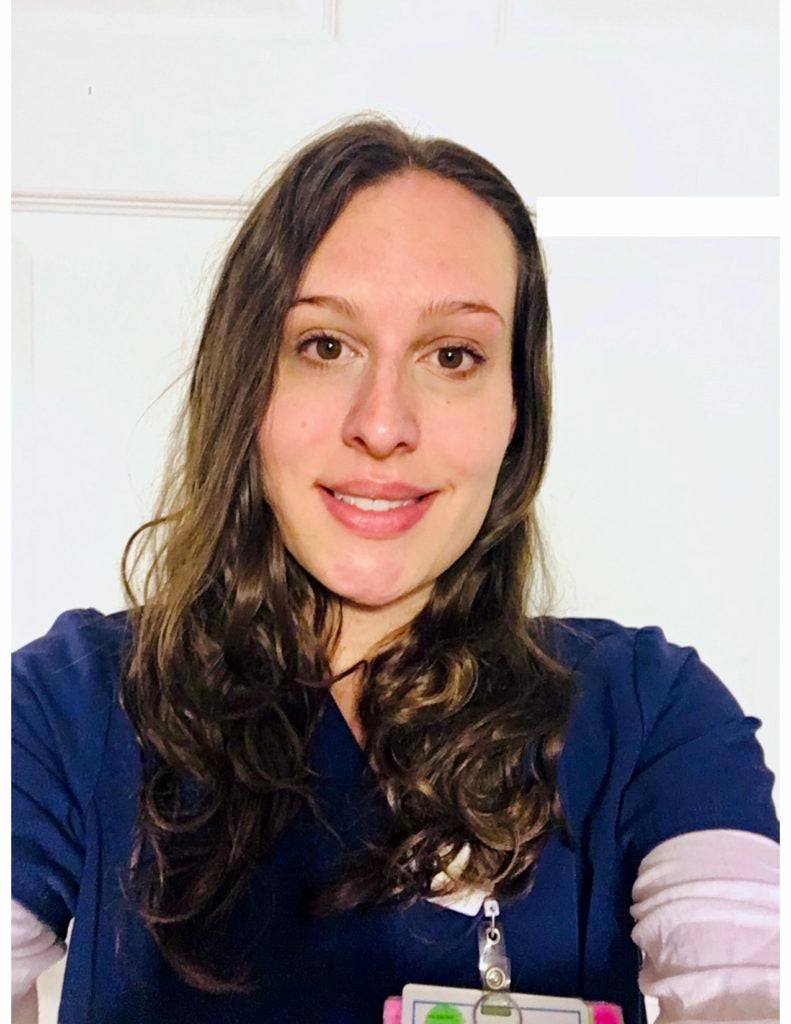BSN Alumna Cares for Patients in COVID-19 ICU in New Jersey
April 21, 2020 – Lauren Gilmore (NHS’17) works as a staff nurse in an intensive care unit at Capital Health Medical Center, a New Jersey hospital system. For about a month, she and her colleagues have been caring for patients with COVID-19 in the unit.
“The past month has been extremely challenging in myriad ways,” Gilmore said. “Normally, our unit is 16 beds. Now, we have restructured the whole unit and expanded it to 24 beds. Almost every patient is COVID positive.”

Equipment has become scarce, and the staffing level has been overtaxed, she said.
“We have had PPE shortages, so we are reusing N95s for the whole 12-hour shift and then for up to three shifts,” Gilmore explained. “We wear tyvek suits over our scrubs, surgical gowns in the room, a mask, and a face shield. Then when we come out of the room, we have to be wiped down with alcohol wipes.”
Providing Patient Care
“We try to cluster our care and help each other if we need to grab supplies for another nurse,” she added. “I know other places are in much worse situations with PPE, so I consider us lucky in that regard.”
Gilmore said that the “biggest issue has been staffing, there are too many sick patients and not enough ICU nurses who are able to manage a patient on a ventilator.” Because of that, she noted, the patient volume for each ICU nurse has increased.
“We try to work together as best we can to try and deal with such an unprecedented volume of critically ill patients,” she said. “We are running low on ventilators, which is something I didn’t even think was possible.”
‘Saddest and Hardest Part’
Gilmore added that the separation of critically ill patients from their loved ones has been very hard to witness.
“I think the saddest and hardest part for me is having the patients there without any of their family,” she said. “If a patient is COVID positive, there cannot be any visitors, even if a decision is made regarding end-of-life care or if a patient dies. I cannot imagine the anxiety of having a close relative in an ICU, without being able to be at the bedside with them in the hospital.”
Updates are provided over the phone to families, she said.
“I truly cannot imagine not being there with your loved one as they pass away,” she said. “It’s scary because some of the patients are young. Some don’t have much past medical history or preexisting conditions, but they still end up on a ventilator fighting for their life. It makes me sick to think about what it would be like to get the news that your family member died and that you could not be there to have that closure and peace of mind.”
‘Men and Women for Others’
Gilmore said she is drawing on her education at Georgetown to confront “this moment” – including the nursing knowledge she gained through classes, clinicals, and exams.
“Georgetown’s emphasis on being men and women for others and promoting the service of others has been important throughout this time,” she said. “For many patients, it is us, the nurses, who are there day in and day out.”
She and her colleagues, she said, have provided the connectedness and continuity for the patients and their loved ones.
“We put ourselves at risk to care for others, doing the things the patients cannot do for themselves,” she said. “We are keeping them comfortable and safe. We pass on messages of hope and encouragement from their loved ones. And we are the ones holding their hands as they pass away. Our whole profession is intertwined with all of Georgetown’s core values, and I am grateful that I have a job that lets me have such a direct impact on others.”
“It’s been a very difficult time for patients, for families, and for health care workers,” Gilmore said. “I’m sure I speak on behalf of everyone when I say that I cannot wait for this whole ordeal to be over.”
- Tagged
- COVID-19
